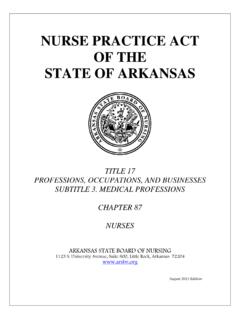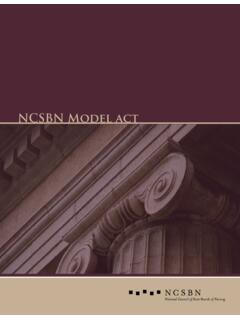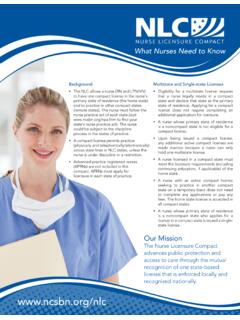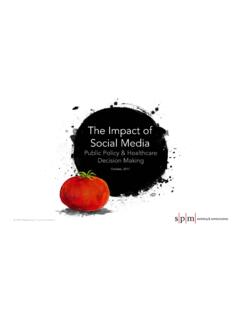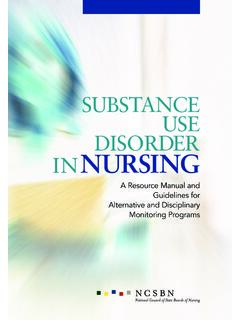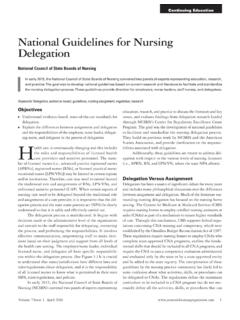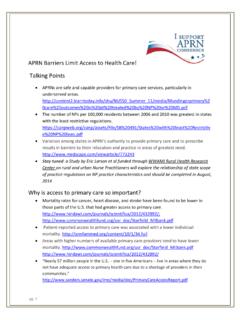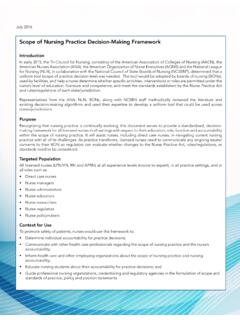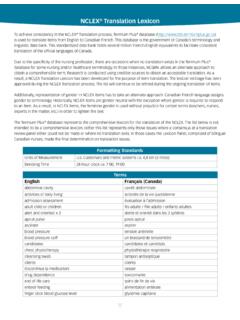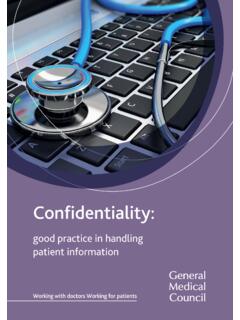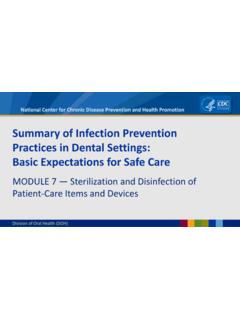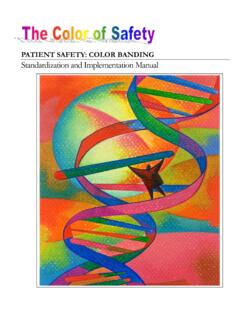Transcription of White Paper: A Nurse’s Guide to the Use of Social Media
1 1 White Paper: A Nurse s Guide to the Use of Social MediaAugust 2011 IntroductionThe use of Social Media and other electronic communication is increasing exponentially with growing numbers of Social Media outlets, platforms and applications, including blogs, Social networking sites, video sites, and online chat rooms and forums.
2 Nurses often use electronic Media both personally and professionally. Instances of inappropriate use of electronic Media by nurses have been reported to boards of nursing (BONs) and, in some cases, reported in nursing literature and the Media . This document is intended to provide guidance to nurses using electronic Media in a manner that maintains patient privacy and Media can benefit health care in a variety of ways, including fostering professional connections, promoting timely communication with patients and family members, and educating and informing consumers and health care are increasingly using blogs.
3 Forums and Social networking sites to share workplace experiences particularly events that have been challenging or emotionally charged. These outlets provide a venue for the nurse to express his or her feelings, and reflect or seek support from friends, colleagues, peers or virtually anyone on the Internet. Journaling and reflective practice have been identified as effective tools in nursing practice. The Internet provides an alternative Media for nurses to engage in these helpful activities.
4 Without a sense of caution, however, these understandable needs and potential benefits may result in the nurse disclosing too much information and violating patient privacy and confidentiality. Health care organizations that utilize electronic and Social Media typically have policies governing employee use of such Media in the workplace. Components of such policies often address personal use of employer computers and equipment, and personal computing during work hours. The policies may address types of websites that may or may not be accessed from employer computers.
5 Health care organizations also maintain careful control of websites maintained by or associated with the organization, limiting what may be posted to the site and by employer s policies, however, typically do not address the nurse s use of Social Media outside of the workplace. It is in this context that the nurse may face potentially serious consequences for inappropriate use of Social and PrivacyTo understand the limits of appropriate use of Social Media , it is important to have an understanding of confidentiality and privacy in the health care context.
6 Confidentiality and privacy are related, but distinct concepts. Any patient information learned by the nurse during the course of treatment must be safeguarded by that nurse. Such information may only be disclosed to other members of the health care team for health care purposes. Confidential information should be shared only with the patient s informed consent, when legally required or where failure to disclose the information could result in significant harm. Beyond these very limited exceptions the nurse s obligation to safeguard such confidential information is universal.
7 Privacy relates to the patient s expectation and right to be treated with dignity and respect. Effective nurse-patient relationships are built on trust. The patient needs to be confident that their most personal information and their basic dignity will be protected by the nurse. patients will be hesitant to disclose personal information if they fear it will be disseminated beyond those who have a legitimate need to know. Any breach of this trust, even inadvertent, damages the particular nurse-patient relationship and the general trustworthiness of the profession of nursing.
8 Federal law reinforces and further defines privacy through the Health Insurance Portability and Accountability Act (HIPAA). HIPAA regulations are intended to protect patient privacy by defining individually identifiable information and establishing how this information may be used, by whom and under what circumstances. The definition of individually identifiable information includes any information that relates to the past, present or future physical or mental health of an individual, or provides enough information that leads someone to believe the information could be used to identify an individual.
9 Breaches of patient confidentiality or privacy can be intentional or inadvertent and can occur in a variety of ways. Nurses may breach confidentiality or privacy with information he or she posts via Social Media . Examples may include comments on Social 2networking sites in which a patient is described with sufficient detail to be identified, referring to patients in a degrading or demeaning manner, or posting video or photos of patients .
10 Additional examples are included at the end of this ConsequencesPotential consequences for inappropriate use of Social and electronic Media by a nurse are varied. The potential consequences will depend, in part, on the particular nature of the nurse s conduct. BON ImplicationsInstances of inappropriate use of Social and electronic Media may be reported to the BON. The laws outlining the basis for disciplinary action by a BON vary between jurisdictions. Depending on the laws of a jurisdiction, a BON may investigate reports of inappropriate disclosures on Social Media by a nurse on the grounds of: Unprofessional conduct; Unethical conduct; Moral turpitude; Mismanagement of patient records; Revealing a privileged communication; and Breach of confidentiality.

